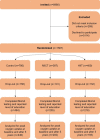Effects of 5 Years Aerobic Exercise on Cognition in Older Adults: The Generation 100 Study: A Randomized Controlled Trial
- PMID: 34878637
- PMCID: PMC9213353
- DOI: 10.1007/s40279-021-01608-5
Effects of 5 Years Aerobic Exercise on Cognition in Older Adults: The Generation 100 Study: A Randomized Controlled Trial
Abstract
Objective: The objective of this study was to investigate whether a 5-year exercise intervention and change in peak oxygen uptake ([Formula: see text]) is associated with cognitive function in older adults.
Methods: Nine hundred and forty-five participants (48% women, mean age at study end 78.2 ± 2.02 years) from the Generation 100 Study were randomized 2:1:1 to a control group, moderate-intensity continuous training or high-intensity interval training twice weekly for 5 years. Peak oxygen uptake was measured using ergospirometry at baseline and after 5 years. Global cognition and mild cognitive impairment (MCI) were assessed with the Montreal Cognitive Assessment scale (MoCA) after 5 years.
Results: Compared to the control group, the combined moderate-intensity continuous training plus high-intensity interval training (ExComb) group did not have significantly different cognitive scores (beta value 0.26, 95% confidence interval [CI] - 0.17, 0.69) or odds of MCI (odds ratio 0.86, 95% CI 0.66, 1.13). Men in the ExComb group had 0.80 points higher MoCA (95% CI 0.21, 1.40) and 32% lower odds of MCI compared with male controls (95% CI 0.47, 0.99), with no such findings in women. In the total sample, each 1 metabolic equivalent of task increase in [Formula: see text] corresponded to 0.46 points higher MoCA (95% CI 0.25, 0.67) and 27% lower odds of MCI (95% CI 0.63, 0.85). Compared to [Formula: see text] stable, participants whose [Formula: see text] increased did not have significantly different cognitive scores (beta value 0.24, CI - 0.68, 1.15) or odds of MCI (odds ratio 0.70, 95% CI 0.36, 1.34), whereas participants whose [Formula: see text] decreased had 0.64 points lower MoCA (95% CI - 1.15, - 0.14) and 35% higher odds of MCI (95% CI 0.98, 1.87).
Conclusions: Overall, exercise was not significantly associated with cognition among older adults. However, maintaining or increasing [Formula: see text] appeared to benefit cognition.
Clinical trial registration: ClinicalTrials.gov NCT01666340.
© 2021. The Author(s).
Conflict of interest statement
The authors declare no conflicts of interest.
Figures
References
-
- Prince M, Wimo A, Guerchet M, Ali G-C, Wu Y-T, Prina M. World Alzheimer Report 2015. The global impact of dementia An analysis of prevalence, incidence, cost and trends. London: Alzheimer’s Disease International; 2015.
-
- Gjøra L, Strand BH, Bergh S, Borza T, Braekhus A, Engedal K, et al. Current and future prevalence estimates of mild cognitive impairment, dementia, and its subtypes in a population-based sample of people 70 years and older in Norway: the HUNT Study. J Alzheimers Dis. 2021;79(3):1213–1226. doi: 10.3233/JAD-201275. - DOI - PMC - PubMed


